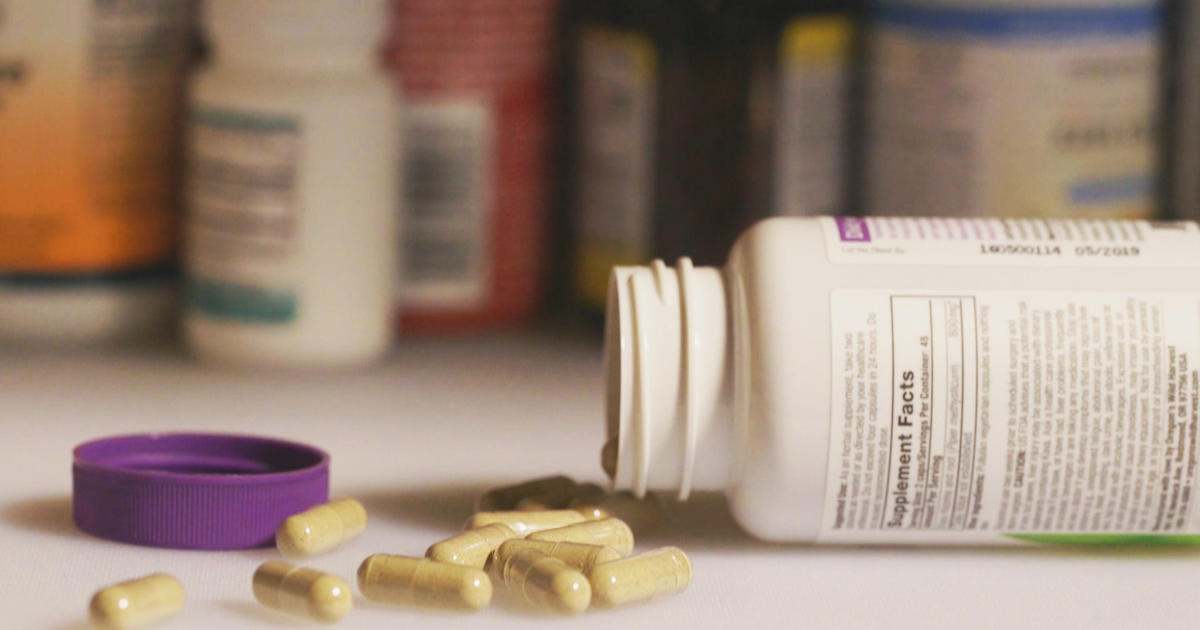CBS News
Dietary supplements and protein powders aren’t regulated the same way drugs are — here’s what experts say to watch out for

Emily Hemendinger is an assistant professor of psychiatry at University of Colorado Anschutz Medical Campus and Katie Suleta is a Ph.D. candidate in medicine and health at George Washington University.
Dietary supplements are a big business. The industry made almost $39 billion in revenue in 2022, and with very little regulation and oversight, it stands to keep growing.
The marketing of dietary supplements has been quite effective, with 77% of Americans reporting feeling that the supplement industry is trustworthy. The idea of taking your health into your own hands is appealing, and supplements are popular with athletes, parents and people trying to recover more quickly from a cold or flu, just to name a few.
A 2024 study found that approximately 1 in 10 adolescents have used nonprescribed weight loss and weight control products, including dietary supplements.
Notably, that systematic review found that nonprescribed diet pill use was significantly higher than the use of nonprescribed laxatives and diuretics for weight management. These types of unhealthy weight control behaviors are associated with both worsened mental health and physical health outcomes.
As a licensed clinical social worker specializing in treating anxiety disorders and eating disorders and a biomedical research director, we’ve seen firsthand the harm that these supplements can do based on unfounded beliefs. The unregulated market of dietary supplements is setting consumers up to be misled and potentially seriously harmed by these products.
The Wild West
The Food and Drug Administration specifies that supplements must contain a “dietary ingredient” such as vitamins, minerals, herbs, amino acids, enzymes, live microbials, concentrates and extracts, among others.
Unfortunately, manufacturers can claim that a product is a supplement even when it doesn’t meet those criteria, such as products containing the drug tianeptine, a highly addictive drug that can mimic the biological action of opioids. Some of these products are labeled as dietary supplements but are anything but.
Products containing kratom, a substance with opioidlike effects, which are sold over the counter in many gas stations, claim to be herbal supplements but are mislabeled.
Under a 1994 law, dietary supplements are classified as food, not as drugs. This means dietary supplements are not required to prove efficacy, unlike drugs. Regulators also don’t take action on a product until it is shown to cause harm.
However, the FDA’s website states that “many dietary supplements contain ingredients that have strong biological effects which may conflict with a medicine you are taking or a medical condition you may have. Products containing hidden drugs are also sometimes falsely marketed as dietary supplements, putting consumers at even greater risk.”
In other words, supplements are regulated as food instead of drugs, even though they can interact with medications and may be laced with hidden drugs not included on the label.
Manufacturers of dietary supplements can make claims about their products that fall into three categories: health claims, nutrient content claims and claims about the product’s function, structure or both, all without needing to provide supporting evidence.
Misbranding and false advertising are rampant with dietary supplements, including false claims of curing cancer, improving immune health, improving cognitive functioning, improving fertility, improving cardiovascular health and, of course, promoting weight loss and weight control.
The FDA is cracking down
You can find supplements that claim to be good for just about every health condition, concern or goal, so it should be no surprise that there are supplements marketed for weight loss.
In August 2021, the FDA cracked down on some of these weight loss products because of the presence of undeclared drugs. For example, of the 72 products recalled, the drug sibutramine, sold as Meridia, was found in 68 of them.
While the FDA may take further action beyond the recalls, the agency acknowledged that it is not able to test every weight loss supplement for contamination with drugs.
These crackdowns demonstrate some progress, though several issues remain. Warning label placement, ingredients and beliefs based on misleading or false advertising are still highly problematic.
Some weight loss supplements may have FDA warnings on them. Of those that do, the disclaimers are rarely displayed on the front of the product label, so consumers are less likely to see them.
Ingredients in weight loss supplements can and do have adverse effects. They have caused people to be admitted to the emergency room for cardiovascular and swallowing problems, including in young, seemingly healthy people.
Eating disorders
Mental health concerns and eating disorders are on the rise. As a result, researchers are examining unhealthy weight control behaviors, including the use of dietary supplements and how accessible they are to adolescents and children.
People who have eating disorders often suffer related health issues such as bone loss, osteoporosis and vitamin deficiencies. In response, their doctors may prescribe dietary supplements like calcium, vitamin D and nutritional supplement shakes. But these are not the dietary supplements of concern.
The concern is with supplements that promote weight loss, muscle building or both.
People with eating disorders may be attracted to dietary supplements that claim quick and pain-free weight loss or muscle gain. Additionally, dietary supplement users may struggle with an increase in compulsive exercise or other unhealthy weight control behaviors.
Diet pill and supplement use has also been associated with increased risk for developing eating disorders and disordered eating, as well as low self-esteem, depression and substance use. While dietary supplements do not solely cause eating disorders or disordered eating, they are one contributing factor that may be addressed with preventive measures and regulations.
The allure of protein powders and fitness supplements
Protein powders and other fitness supplements also have wide appeal. Research shows that girls are more at risk than boys for using weight loss supplements. But a growing problem in boys is the use of fitness supplements such as protein powder and creatine products, a compound that supplies energy to the muscles.
Use of fitness supplements sometimes signifies a preoccupation with body shape and size. For example, a 2022 study found that protein powder consumption in adolescence was associated with future use of steroids in emerging adulthood.
Protein powders make claims of building lean muscles, while creatine boasts providing energy for short-term, intense exercise.
Protein itself is not harmful at recommended doses. However, protein powders may contain unknown ingredients, such as certain toxins or extra and excessive sugar. They can also be dangerous when used in excess and to replace other foods that possess vital nutrients.
And while creatine can usually be safely used in adults, overuse can lead to health problems and is not recommended for minors. Ultimately, the impact of long-term use of these supplements, especially in adolescents, is unstudied.
Possible solutions
One proposed regulation by researchers at Harvard University includes taxing dietary supplements whose labels tout weight loss benefits.
Another policy recommendation involves banning the sale of dietary supplements and other weight loss products to protect minors from these underregulated and potentially dangerous products.
In 2023, New York successfully passed legislation that banned the sale of these products to minors, while states including Colorado, California and Massachusetts have considered or are considering similar action.
Ultimately, medical professionals recommend that parents and caregivers encourage their children to get protein and vitamins from whole foods instead of turning to supplements and powders. They also recommend encouraging teens to focus on balanced nutrition, sleep and recovery, and a variety of resistance, strength and conditioning training.
This article is republished from The Conversation under a Creative Commons license.
CBS News
Trump makes more Cabinet picks but some top economic posts remain unfilled

Watch CBS News
Be the first to know
Get browser notifications for breaking news, live events, and exclusive reporting.
CBS News
Open: This is “Face the Nation with Margaret Brennan,” Nov. 24, 2024

Watch CBS News
Be the first to know
Get browser notifications for breaking news, live events, and exclusive reporting.
CBS News
Popular gluten free tortilla strips recalled over possible contamination with wheat

A food company known for popular grocery store condiments has recalled a package of tortilla strips that may be contaminated with wheat, the U.S. Food and Drug Administration said Friday. The product is meant to be gluten-free.
Sugar Foods, a manufacturing and distribution corporation focused mainly on various toppings, artificial sweeteners and snacks, issued the recall for the “Santa Fe Style” version of tortilla strips sold by the brand Fresh Gourmet.
“People who have a wheat allergy or severe sensitivity to wheat run the risk of serious or life-threatening allergic reaction if they consume the product,” said Sugar Foods in an announcement posted by the FDA.
Packages of these tortilla strips with an expiration date as late as June 20, 2025, could contain undeclared wheat, meaning the allergen is not listed as an ingredient on the label. The Fresh Gourmet product is marketed as gluten-free.
Sugar Foods said a customer informed the company on Nov. 19 that packages of the tortilla strips actually contained crispy onions, another Fresh Gourmet product normally sold in a similar container. The brand’s crispy onion product does contain wheat, and that allergen is noted on the label.
U.S. Food and Drug Administration
No illnesses tied to the packaging mistake have been reported, according to the announcement from Sugar Foods. However, the company is still recalling the tortilla strips as a precaution. The contamination issue may have affected products distributed between Sept. 30 and Nov. 11 in 22 states: Arizona, California, Colorado, Florida, Georgia, Iowa, Idaho, Illinois, Indiana, Maryland, Maine, Michigan, Minnesota, North Carolina, New Jersey, Ohio, Oregon, Pennsylvania, Texas, Utah, Virginia and Washington.
Sugar Foods has advised anyone with questions about the recall to contact the company’s consumer care department by email or phone.
CBS News reached out to Sugar Foods for more information but did not receive an immediate reply.
This is the latest in a series of food product recalls affected because of contamination issues, although the others involved harmful bacteria. Some recent, high-profile incidents include an E. coli outbreak from organic carrots that killed at least one person in California, and a listeria outbreak that left an infant dead in California and nine people hospitalized across four different states, according to the Center for Disease Control and Prevention. The E. coli outbreak is linked to multiple different food brands while the listeria outbreak stemmed from a line of ready-to-eat meat and poultry products sold by Yu-Shang Foods.


